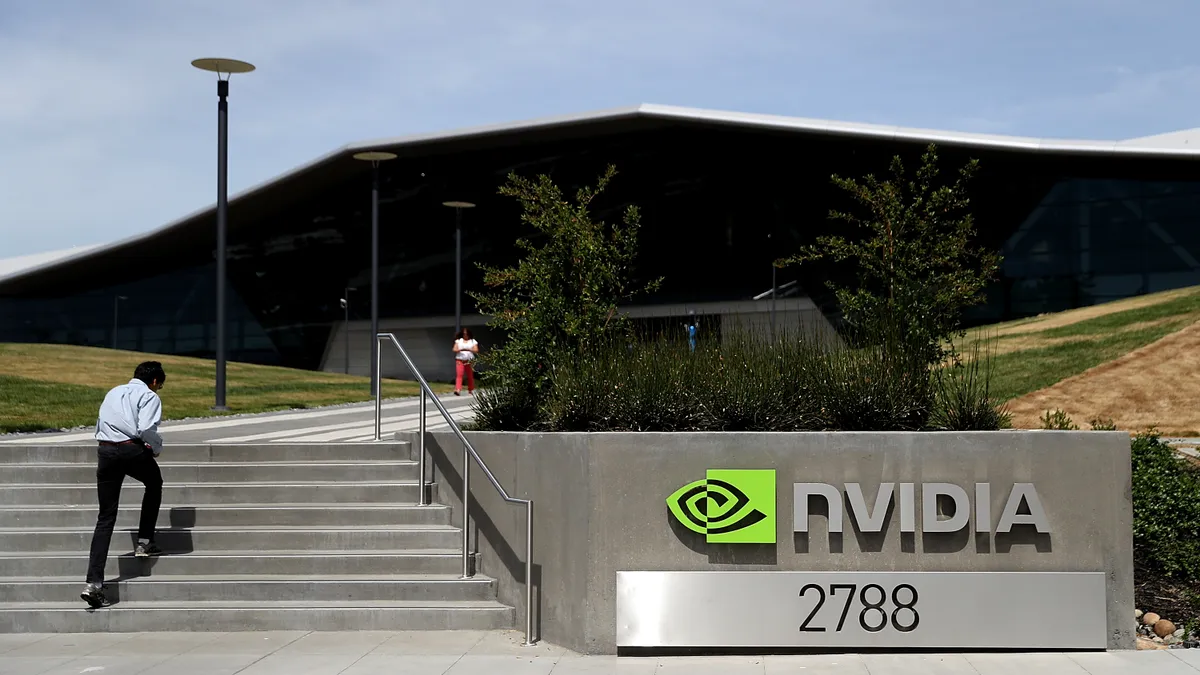Dive Brief:
- Chip maker Nvidia last week capped off big tech’s latest quarterly earnings season with record results that highlighted the continued rising demand for artificial intelligence.
- The tech sector’s “magnificent seven” — Alphabet, Amazon, Apple, Meta, Microsoft, Nvidia and Tesla — posted a combined $460.26 billion in revenues for the first quarter of the year, a 14% jump on an annual basis, according to a CFO Dive analysis. Despite a strong quarter overall for the group, not all of the companies reported revenue gains. Among the ones that did, Nvidia led the pack with total quarterly revenues of $26 billion, a 262% increase from a year ago. The chip maker’s net income rose 628% year-over-year to $14.9 billion.
- “The next industrial revolution has begun,” Nvidia CEO Jensen Huang said during a Wednesday earnings call, adding that he expected AI to “bring significant productivity gains to nearly every industry and help companies be more cost and energy efficient while expanding revenue opportunities.”
Dive Insight:
Gartner predicts that AI software spending will surge to $297.9 billion by 2027, up from $124 billion in 2022.
While AI has been credited with boosting tech profits and stocks, analysts have been divided over whether the boom reflects a potential bubble that could burst at some point in the future.
All of this comes as CFOs across the broader business community are carefully weighing the potential costs, benefits and risks of investing in AI.
As corporate AI budgets continue to expand, finance chiefs will likely find themselves under rising pressure to demonstrate the return on investment for such expenditures, Frances Karamouzis, an analyst at Gartner, said last week at a conference hosted by the research and advisory firm.
The proportion of S&P 500 companies mentioning AI on earnings calls rose to 36% in the fourth quarter of last year, Goldman Sachs analysts wrote in a February research note.
The report highlighted several companies, including Microsoft, Amazon, and IBM, that were expecting AI to produce results such as enhanced productivity, reduced costs, and improved product offerings.
Meanwhile, a Grant Thornton survey unveiled in January found that AI topped the list of areas cited by tech CFOs as technology-related investment priorities for 2024.
Big tech companies, for their part, have been locked in an AI investment race since Microsoft-backed OpenAI introduced its groundbreaking ChatGPT tool.
Nvidia stock rose 9.3% on Thursday, closing above $1,000 for the first time, according to Yahoo Finance. The company announced a 10-for-1 stock split and an increased dividend.
“The AI Revolution starts with Nvidia and in our view the AI party is just getting started with the popcorn getting ready,” analysts at Wedbush Securities said in a Wednesday client note shared with CFO Dive.
In their most recent fiscal quarter, Microsoft, Alphabet, Amazon, and Meta grew their revenues by double-digit percentages compared with a year ago. But Apple and Tesla saw their revenues drop by 4% and 9% respectively.
Big tech’s heavy investments in AI received mixed reviews from Wall Street during the early part of the most recent earnings season. Microsoft and Google were rewarded with stock gains the day after their earnings reports, but Meta’s stock plummeted — an outcome that analysts attributed in part to its plan to double down on AI spending as it also braced for slowing sales.
Coming into the latest earnings season, investors were initially nervous, with questions about whether the AI boom had run too far, potentially leaving Microsoft, Nvidia and other big tech companies at risk of being unable to meet Wall Street’s high expectations, according to a Bloomberg report.
“A month later, most of those concerns have been put to rest with the S&P 500 Index sitting at an all-time high on the back of strong corporate profits,” the report said.














